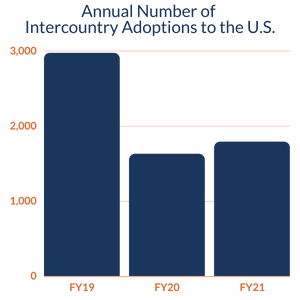NCFA Responds to the Department of State FY 2021 Annual Report on Intercountry Adoption
The U.S. Department of State has published its annual report on intercountry adoptions completed between October 1, 2020 through September 30, 2021. During this time, there were 1,785 intercountry placements. By way of comparison, in fiscal year 2020, there were 1,622 intercountry placements; in fiscal year 2019, prior to the pandemic, there were 2,970 placements. The Department rightly notes the impact of the covid-19 pandemic on placements during both the FY2020 and FY2021 reporting periods, with countries such as China still not processing adoptions due to the pandemic.

We note that many of the countries among the top ten sending countries in FY21 have had longstanding adoption partnerships with the United States. We encourage the Department of State to work with accredited providers to establish new country partnerships as well.

Concern for Delays in Adoption Processing
The Department’s report contains a table displaying the average number of days to completion of a Hague Convention country adoption. The ten Convention countries with the most placements in FY21, are listed in the table below:

As dire as these numbers are, this table significantly underestimates the actual timeframe an adoption takes, because it does not account for the time a family has spent before the prospective adoptive parents file their adoption paperwork with USCIS. It nonetheless shows a staggeringly long span of time for an adoption to be completed. Measured in terms of child’s life, this timeframe discloses that so often years of a child’s life are spent living outside of permanent family care. Social scientists, neuropsychologists, medical doctors, and child development specialists all agree that the length of time a young child experiences institutionalization can having lifelong impacts. We should – and we can – do better to reduce the processing timeframes so that children spend less time in institutions and more of their childhood in a family.
While some delays are outside the control of U.S. adoption professionals and the U.S. government, oftentimes, a large part of the timeframe delays are due to inefficient systems and processing of the U.S. government. We have previously worked with adoption professionals to identify where there are stuck points and problems in our current system – findings that have been shared with U.S. government adoption authorities. Unfortunately, this has not been taken seriously – and the problem only seems to be getting worse. NCFA calls upon – and pledges to work cooperatively with – the Department of State and USCIS to reduce systematic processing delays of intercountry cases.
Improvement is Needed in Reporting to Congress and the Public
Report Requirements
The annual report on intercountry adoption is done in accordance with the Intercountry Adoption Act of 2000 (IAA) and, more recently, the Intercounty Adoption Information Act of 2019 (IAIA). Both laws require the Department to report to Congress on specific aspects of intercountry adoption, including the number of placements, the cost and timeframe of placements, the Department’s work with countries prohibiting adoption, and much more.
Congress’ intent in passing the IAIA was clear: to require the Department to disclose its efforts with regards to countries that do not have functioning international adoption programs with the United States and “to encourage the resumption of halted or stalled adoption proceedings…regardless of whether the adoptions have occurred under the Convention.”
Specifically, the law requires that:
(12) Information on any action the Secretary carried out that prevented, prohibited, or halted any adoptions involving immigration to the United States, regardless of whether the adoptions occurred under the Convention.
(13) For each country listed pursuant to paragraph (12), a description of--
(A) what policies, procedures, resources, and safeguards the country lacks, or other shortcomings or circumstances, that caused the action to be carried out;
(B) what progress the country has made to alleviate those shortcomings; and
(C) what steps the Department of State has taken in order to assist the country to reopen intercountry adoptions.
Requirements not met
- Prior to 2010, the Department concluded that the international adoption programs of Guatemala, Nepal, and Cambodia were not capable of being partner countries with the United States. Yet the Department failed to list those countries in the report as mandated under subsection (12).
- The IAIA was enacted to require the State Department to explicitly disclose the problems, missing safeguards, or other issues that prevent the United States from resuming international adoption from these countries. The Department has not complied.
- Nor has the Department complied with subsection (c) of subsection (13) which mandates that the State Department disclose the steps it has taken to assist these countries to remedy these deficiencies.
- The Department is also required to provide an assessment of how accreditation fees impact “… low-income families, families seeking to adopt sibling groups, or families seeking to adopt children with disabilities.” The Department’s Report does not provide such an assessment.
Inaccurate and Incomplete Reporting
While some of the information in the FY21 report is useful (e.g., the number of placements per country by visa type), unfortunately, much of the information produced often lacks meaningful and accurate data for Congress and the public to utilize. NCFA has shared many of these concerns with the Department for years, yet no change has been made to provide more accurate or meaningful information or to bring the reporting in accordance with Congressional requirements. Examples of this are provided below:
The Report contains misleading information about the cost of intercountry adoption accreditation.
NCFA, adoption agencies, and the accrediting entities have provided the Department with information showing that the actual cost of accreditation is significantly more expensive than the Department’s report indicates – however, the Department continues to publish misleading information, making it appear the cost is far less than what agencies actually pay to obtain and maintain their accreditation. While the Department does link to the accrediting entity’s fee schedule, that does not fulfill the IAA’s requirement in §104(b)(8) for reporting on this information.
It also does not fulfill the requirement of § 104(b) (14), which requires an assessment of the impact of accreditation on families seeking to adopt internationally. Such an assessment can only be done in the context of an evaluation of the total fees a family has to pay to complete an adoption. By way of illustration, the report states the fees for an adoption from Vietnam are $13,645. However, Holt Adoption, one of only two agencies accredited by the Vietnamese government, estimates the total fees at $33,795 – $48,490.
The Department does not accurately provide what the IAA requires in §104(b)(7). The law requires that the Department report, “The range of adoption fees charged in connection with Convention adoptions involving immigration to the United States and the median of such fees set forth by the country of origin.” As demonstrated above, instead, the Department report only reports what accredited providers charge adoptive families – far less than the actual cost of adoption. They do not provide information on “the median of such fees set forth by the country of origin.”
The Report contains misleading information about the time required to complete an intercountry adoption.
As explained earlier, the Department’s data on adoption process timeframes is based on when immigration forms are filed and adjudicated – which is not what Congress requires reporting on. By not including the months of paperwork and process that must be completed prior to immigration paperwork being filed, the Department is reporting inaccurate information, and being disingenuous to the time, energies, and work put in by adoptive families and adoption professionals.
The Department can and should comply with the legal statute which requires them to provide Congress with information about the average timeframes of the entire adoption process in Hague Convention countries. Working collaboratively with accredited agencies or obtaining the information from its approved accrediting entity, the Department would be able to provide a more accurate picture of timeframes. Though not required by statute, NCFA believes that publishing timeframes for adoption in non-Convention countries would yield significant value and insight to those considering adoption and professionals working in those countries.
List of accredited/approved providers fails to fulfill what Congress intended
The Department is required to report each year “[t]he current list of agencies accredited and persons approved under this Act [IAA] to provide adoption services.” The intent was for Congress to know how many agencies were accredited and persons approved at the end of each fiscal year, in order to establish a historical record and points of comparison. Instead of providing a list of agencies and persons that were accredited/approved at the end of FY21, the Department’s report links to their website which then links to the external website on the accrediting entity’s website, which only provides a listing of agencies and persons accredited/approved at that point in time when the page is accessed. It is not organized by date and therefore cannot fulfill Congress' requirement to report how many agencies were accredited/persons approved at the end of the fiscal year. The Department’s failure to provide such a listing deprives Congress and the public of having historical information about which and how many accredited providers were operating each year. FY21 is not the first time the report has failed to meet this requirement. With a second accrediting entity being approved in 2022, using external links will be even more problematic hereafter.
Failing to provide timely, accurate, and legally required information to Congress and the public can have real, negative consequences. NCFA calls upon the Department to provide better information going forward – but also to update past reports to provide the information Congress intended. Such information can help policymakers, prospective adoptive parents, and accredited adoption service providers, and make better-informed decisions about intercountry adoption.
Time for Collaboration and Change
For a number of years now, the intercountry adoption community has experienced a significant number of stressors, impacting all those involved in serving children and families. The time is ripe to revise our processes and build a better functioning system that can meet the needs of all those connected to our work – especially those of children whose interests should remain paramount in all that we do.
NCFA acknowledges the contributions of Dr. Diane B. Kunz, Executive Director, the Center for Adoption Policy, to this report.
References:
- https://www.congress.gov/bill/116th-congress/house-bill/1952/text
- https://www.holtinternational.org/adoption/vietnam/
- Intercountry Adoption Act, §104(b)(5)

